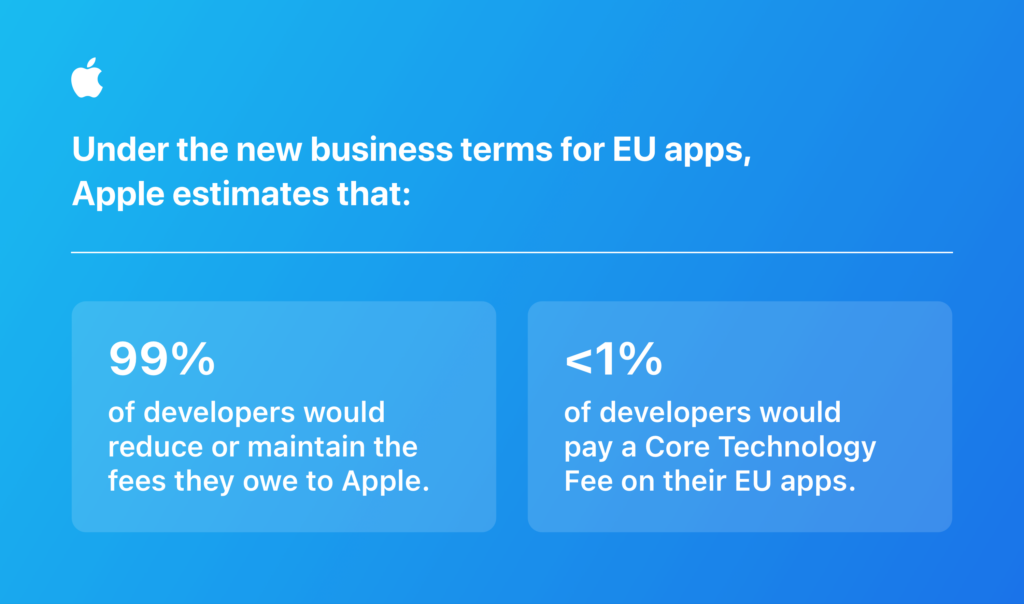Apple’s new Core Technology Fee could cost free apps $400,000 a month (or you can just stick with the old App Store rules)
Think back to 2013. An unknown developer in Vietnam built a truly simple game with a silly name that exploded to 90 million downloads on mobile app stores. It was, of course, Flappy Bird, and its creator Dong Nguyen was soon making $50,000 a day in ad revenue.
Now imagine doing the same thing in the EU in 2024. Some teen makes a cool app with a no-code tool, gets excited about distributing it freely outside the App Store, and makes that the ill-fated choice. If lightning strikes and virality happens, an equivalent $1.5 million in monthly ad revenue would not go far thanks to the new Apple Core Technology Fee. At 90 million installs, the CTF would be $4 million or €3,708,333 each month: 50 euro cents per install over 1 million. Freedom, meet rookie mistake.
That’s an extreme edge case, of course.

But a moderately viral game with a more modest 10 million downloads in year 1 would incur monthly platform fees of $407,609 a month: not as astronomical but clearly and obviously unsustainable for any ad-supported app. And a somewhat successful hypercasual game with 3 million installs in the EU would pay $90,580 per month to Apple thanks to the Core Technology Fee.
Ouch.
Apple’s Core Technology Fee is part of its plan to comply with the EU Digital Markets Act
Now we have Apple’s plan.
Developers can either stay on the official App Store and keep their existing terms, or adopt the new terms if they choose to use the DMA-required option of a third-party app store or third-party payment processing.
Those terms are:
- 10% commission to 17% commission on in-app purchases (down from the 30% standard and 15% small business rate)
- 3% payment processing fee if they use Apple as a payment processor
- €0.50 for each first annual install per year over a 1 million threshold: the new Core Technology Fee (CTF)
Most apps will pay less under this plan, Apple says. In fact, 99% of them will:

The reason for that is obvious: most apps fail. Or, at least fail to become large, profitable successes.
I’ve published an app, but you don’t see me retiring to the Bahamas or pontificating about it on panels. That’s simply because — like most apps — it failed to get big. Apps that don’t cross the 1 million install mark will never pay a Core Technology Fee.
Other details for third-party app stores, payment processors
In addition to the financial terms, third party app stores will require authorization from Apple: a process about which we don’t have too many details yet. And Apple will demand that apps that choose to be distributed by third-party app stores will still undergo a “baseline review” in a “notarization” process that involves both automated checks and human review, presumably to screen for fraudulent and/or scammy apps.
That notarization process will result in “app installation sheets,” similar in some sense to information on the App Stores’ app listing pages, and presumably something like the app nutrition labels Apple has required for apps on the App Store that detail privacy implications of installing and using the app.
Apple will also implement unspecified “additional malware protections” that will “prevent iOS apps from launching if they’re found to contain malware after being installed to a user’s device.”
Apps installed from third-party marketplaces or using third-party payments will incur some differences in standard user experience, too:
- Product page labels: warning users they’re downloading an app with non-Apple payments
- In-app warnings: telling users they are not transacting with Apple when buying something
- New app review processes
Upshot: heads I win, tails you lose
The upshot is obvious: no-one who cares about scale and profitability will use these new terms of service, and therefore won’t use alternative payments or third-party app stores. That means the vast majority of apps and games that are focused on growth are better off with the existing App Store arrangements, where the Core Technology Fee will never be an issue.
Going outside the App Store under these terms is insane:
- It will be harder
- There will be more work
- There will be less (maybe no) profit
- The user experience will be worse
- Users will be turned off by various warnings and labels
Some apps may, however, benefit. These would be apps that never intend to go over 1 million installs: perhaps internal apps for a business or organization. It’s possible that avoiding the typical App Store — and Apple’s enterprise program for developers that allows businesses to manage app deployment to thousands or hundreds of thousands of employees — might offer some capabilities that are worth the effort.
But I think it’s unlikely.
Most likely: this will get challenged in court
Presenting an option that isn’t really a choice might not be seen as good-faith compliance by EU regulators. We already know that Epic founder and CEO Tim Sweeney plans to challenge Apple’s American external payments provider plans in court.
I’d be shocked if something similar didn’t happen in Europe.
Until then … stick with the devil you know.
Stay up to date on the latest happenings in digital marketing


